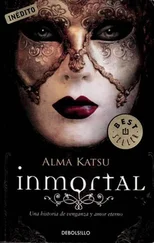He stops in front of a large reconditioned farmhouse outside the St. Andrew city limits. The house is a beauty, one of the biggest and best kept, with touches like pussywillow wreaths decorating the wraparound porch and solar lanterns lining the driveway. The house belongs to a new doctor at the hospital, an anesthesiologist named Peter, who moved up from the city so he could raise his children in the country, where he believes there is no crime or drugs. He is a pathologically nice guy, even to Luke, who, prickly and still grieving from all his recent trouble, had withdrawn from everyone in the past few months.
When Luke knocks at the front door, Peter answers it in bathrobe and slippers, a grave look on his face. He seems to have been rousted out of bed by Luke’s phone call, for which Luke is inwardly embarrassed.
Peter puts a hand on Luke’s arm as they stand in the doorway. “Is everything all right?”
“I’m sorry to ask, it’s a strange request, I know,” Luke says, shuffling from foot to foot, head down. He’s practiced this lie in his head for the last ten minutes. “It’s just… my cousin’s daughter has been staying with me for a few days and I promised her mother I’d get her home in time to make the bus for some school trip. Only my truck is acting up and I’m afraid it won’t make it up there and back…” Luke’s tone blends the right amounts of ineptitude and apology for inconveniencing a friend, projecting a sort of bumble-headed, well-intentioned haplessness that only an ogre would refuse.
Peter looks over Luke’s shoulder at the truck parked at the end of the long driveway, where-Luke knows-he will see Lanny standing beside the truck, her suitcase at her feet. She is too far away for Peter to get a good look at her, in case the police come by later with questions. She gives Peter a little wave.
“Didn’t you just get off shift?” Peter peers back at Luke, so closely that he might be inspecting him for fleas. “Aren’t you tired?”
“Yeah, but I’m okay. It was a quiet night. I got a little sleep,” he lies. “I’ll be careful.”
Peter pulls the keys from a pocket and drops them in Luke’s hand. When Luke tries to give him the keys to the truck in return, Peter balks.
“You don’t need to leave your keys with me… You’re not going to be gone long, are you?”
Luke shrugs, trying to appear nonchalant. “Just in case you have to move it or something. You never know.”
The door to the three-bay garage rises slowly and Luke checks the key fob to find that Peter is entrusting him with a new luxury SUV, gleaming steel gray. Heated leather seats and a DVD player for the second row to keep the children appeased on long road trips. He recalls how people at the hospital gave Peter a hard time the first day he drove up in it, as the vehicle was so uncharacteristic for the area, its shiny coat likely to be eaten up by road salt by the end of its third winter.
Luke backs the car out of the garage and waits at the mouth of the driveway for Lanny to scramble into the passenger seat. “Nice car,” she says as she reaches for the seat belt. “You know how to trade up, don’t you?”
She hums to herself as Luke guides the car down the road, once again headed for the Canadian border-crossing station-this time, half hidden behind darkly tinted windows. He feels guilty for what he’s done. He can’t quite put his finger on why, but he suspects he will not be turning right around once they’ve crossed the border, which is why he left the keys to his dented old pickup with his friend. Not that Peter needs the truck; he obviously has other vehicles if he must go somewhere. Still, it makes Luke feel better, as if he has posted bond or left a token in good faith, because he knows Peter will think less of him soon enough.
Lanny catches Luke’s eye as they coast into an empty intersection. “Thank you,” she says with heartfelt gratitude. “You seem like the kind of man who doesn’t like to ask for favors, so… I want you to know that I appreciate what you’re doing for me.”
Luke just nods, wondering how far he will go and at what cost to help her escape.

BOSTON, 1817
I woke in a different bed in a different room, the dark-haired man from the carriage sitting at the bedside with a bowl of water and a cold compress for my forehead.
“Ah, you’re back among the living,” he said when I’d opened my eyes. He lifted the compress from my brow and dropped it into the water to soak.
A cold light was visible through the window behind him, so I knew it was day, but which day? I checked under the coverlet to see that I was dressed in a plain night shift. They had given me a room to myself that was clearly meant for a senior member of the household staff, small and dutifully appointed.
“Why am I still here?” I asked, groggy.
He ignored my question. “How are you feeling?”
The pain came on dully, sour and hot in my abdomen. “Like I’ve been stabbed with a rusty blade.”
He frowned slightly, then reached for a soup bowl sitting on the floor. “The best thing for you is rest, complete rest. You’ve likely got a puncture somewhere, in there”-he pointed obliquely to my stomach-“and you need to heal as quickly as possible, before infection sets in. I’ve seen it before. It can become serious.”
The babe. I pulled myself upright. “I want to see a physician. Or a midwife.”
He pushed a spoon through clear broth, metal ringing against china. “Too soon for that. We’ll watch awhile, to see if it gets worse.”
Between daubs of the compress and spoonfuls of clear soup, he answered my questions. First, he told me about himself. His name was Alejandro and he was the youngest son of a fine Spanish family from Toledo. Being the youngest son, he had no hope of inheriting the family’s property. The second oldest had joined the military and was captain of a fierce Spanish galleon. The third oldest served in the court of the Spanish king and would shortly be sent as an emissary to a foreign land. Thus, the family had fulfilled its customary obligations to king and country; Alejandro was free to decide his own way in the world, and through various incidents and twists of fate, he eventually found himself with Adair.
Adair, he explained, was bona fide royalty from the old world, as wealthy as some minor princes, having managed to hold on to property that had belonged to his family for centuries. Tired of the old world, he’d come to Boston for the novelty, to experience the new world for himself. Alejandro and the other two from the carriage-Tilde, the woman, and Donatello, the blond man-were Adair’s courtiers. “Every royal keeps a court,” Alejandro said, the first of many circular arguments. “He must be surrounded by educated people of breeding, who can see that his needs are met. We are the buffer between him and the world.”
Donatello, he explained, had come from Italy, where he had been an assistant and muse to a great artist whose name I’d never heard. And Tilde-her background was a mystery, Alejandro confessed. The only thing he knew about her was that she’d come from a northern land as snowy and cold as mine. Tilde had already been with Adair when Alejandro joined the court. “She has his ear and her temper can be formidable, so be careful around her at all times,” he warned, dipping the spoon for more broth.
“It’s not like I’ll be here a minute longer than I need to,” I said, reaching with my mouth for the spoon. “I’ll be gone as soon as I’m feeling better.” Alejandro made no comment, appearing to be concentrating on conveying the next spoonful of broth to my open mouth.
Читать дальше













